Improve Your Blog Post Search Ranking
Optimizing your blog post to rank high in search engines used to be pretty straightforward. You just selected your keyword and used it in the title and a few more times in your article. If you picked the right keyword, you were most likely to rank somewhere in top 10. That’s if your blog was well-established and referenced by Google.
How Keyword Ranking Has Changed
Keyword research has quietly changed over the past few years. First, search engines like Google have become much more sophisticated when it comes to understanding what “high-quality content” is. It’s not only about how well your article is optimized: it’s also how in-depth, useful, and comprehensive it is. Moreover, as Neil Patel explains, keyword stuffing will get you penalized, not rewarded.
Second, the competition is growing: most bloggers know the basics of search engine optimization these days. It’s harder to stand out and get ranked.
Here’s how you can get ahead of your competitors.
Are You Creative With Your Keywords?
Today you can’t write a blog post for each keyword. Search algorithms are more sophisticated and are better able to determine the meaning and effectiveness of your content. They are able to examine a much more varied vocabulary including synonyms, related phrases, and concepts.

Use Tools to Expand Your Keyword List
There are many tools like Soolve which you can use to expand your list of keywords. I will list a few here, to highlight just a few of the tools available to provide keyword assistance.
Seed Keywords allows you to use your friends and followers for suggesting keywords for you. This tool creates shareable mini-surveys to help you brainstorm different ways to search for your topic.
Soovle generates keyword suggestions from sources such as Wikipedia, Amazon, YouTube, Yahoo, Answers.com, and Bing. This gives you a great insight into how people search for your keyword on different platforms.
Another tool that performs like Soovle is the Google Keyword Suggest Tool. It generates suggestions from Google, Bing, YouTube, and Amazon and it digs very deep, so you’ll lots of phrases to consider.
Reference.com and Synonym.com will also help you expand your keyword list through the use of synonyms.

Synonyms are Especially Helpful
Synonyms work very well to help you expand your keyword lists. If you want to optimize your existing blog posts, Serpstat is a terrific tool that can analyze your site and select your most powerful web pages. After this analysis it suggests a list of keywords to consider. These are words your competitors are ranking high for, but you’re not.
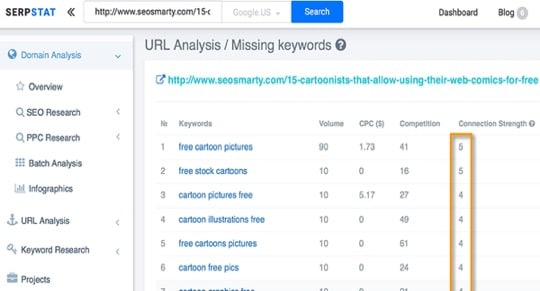
In Serpstat, Connection Strength refers to how many of your competitors rank for a keyword that you don’t have on your page. With this knowledge all you need to do is edit your articles and posts optimizing them with those missing keywords. This should result in an increase in your page ranking.
A quick and easy way to optimize your existing content for these new keywords would be to add new sections including subheadings targeting those new keywords. This helps your content become more comprehensive, which should result in more social media shares and backlinks.
Do You Refer to Specific Entities
Google’s increased focus on entities is perhaps the biggest change in search engine optimization. Entities are notable people, places, organizations, brands, etc., which are associated with your keyword in some way.
To understand how entities help in ranking your content, read this case study by Bill Slawski. Bill rewrote a well-optimized piece in the following way. First by making it much longer. Second by including notable events and people. His results were incredible. The rewritten article began to drive referral traffic from people linking to it, and return visits. Better search rankings too!
Google pays attention to entities when interpreting how concise and useful your content is.

Google’s algorithm pays special attention to entities and how they relate to your content. Additionally, Google’s Knowledge Graph is actually an entity graph. Your search for any notable name will show how Google searches relate to entities.
Use common sense when researching related entities. You probably already know quite a bit about your content’s topic. Search Google. In many situations, Google will suggest related concepts as you type your query.
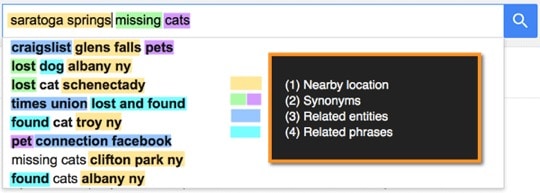
Google Entities Verify Your Content
Google uses entities to verify how useful your content is. You can use local directories and communities to help understand the effect of location based entities.
Use local directories, communites and other sources to understand location-based entities. Check sites like EveryBlock, DirJournal and Going.com
Run content that ranks well through an entity extractor. Select a few articles dealing with topics similar to your’s and run the content through AlchemyAPIor other tools such as TextRazor or Open Calais. AlchemyAPI extracts entities from the content using color-coding to mark up the sentiment.
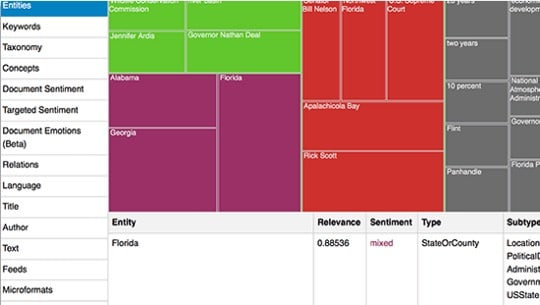
By running several articles on your topic through AlchemyAPI you’ll have a solid list of related entities.
Do You Answer Niche Questions
Google focuses on is measuring your contents ability to answer popular niche questions. You may have noticed Google’s “quick answer boxes” which appear when you type a question into their search box.

Does Your Content Answer Popular Niche Questions?
It’s crucial for you to include question research as part of your keyword research every time you’re writing a blog post. Serpstat also does question focused keyword research. It returns some unique results, which are free.
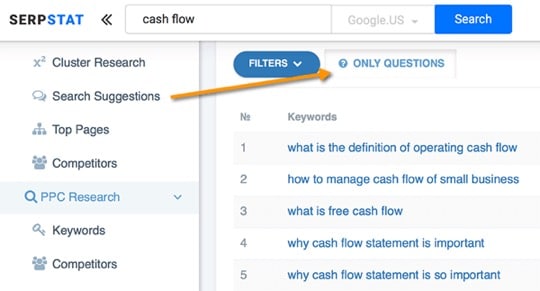
Find Your Search Query Question Modifiers
A cool tool to use for content inspiration and question focused keyword research is Answer The Public. When you type any word into Answer The Public, you see a visual of the types of questions people ask using that word.
The question modifiers used in search queries are usually: who, when, where, how, why, and what.
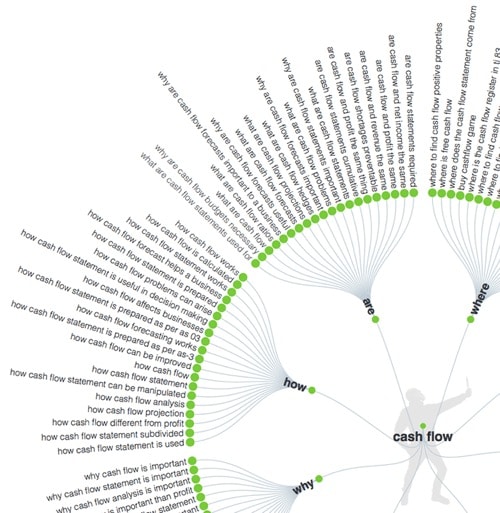
Research Your Niche Questions
Answer The Public is great for content inspiration. You can also research niche questions using Twitter Advanced Search. While Twitter won’t deliver as many content worthy results, it will help you research and use common language. This is something Google focuses on as well, especially for mobile search.
To research your questions on Twitter, simply search a keyword followed by a question mark one space away. It should look like this: “keyword ?” This filters your Twitter search results to those containing a question.






